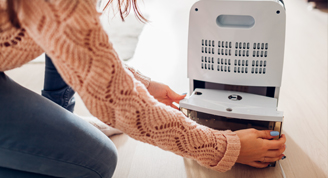In the winter, humidity levels are lower both indoors and outdoors, and the lack of moisture in the air can affect you in several ways. You might walk across the living room and touch the knob on a door, only to get a zap! Maybe you wake up each morning feeling as if you have swallowed sand in the middle of the night.
One way to combat dry winter air is to install or use a humidifier in your home. Humidifiers come in a range of sizes and styles. Learn more about the benefits of using one and your installation options.
Dry Air and Your Health
The temperature of the air affects its ability to hold moisture. Hot or warm air can hold more moisture, which is why the weather tends to be both hot and humid during Southern Maryland summers. Cold air does not retain moisture as well, so the air in the winter is often considerably drier. Modern heating systems can also dry out the air inside your home, which can affect your health.
When the air around you is dry, you are likely to notice it. Your skin might feel dry and itchy, and your lips might chap more easily or become cracked and bleeding. Some people experience respiratory discomfort or problems because of dry air. For example, your nasal passages are lined with mucus, which helps to keep them properly moisturized. When you inhale air that does not have a lot of moisture in it, the dry air travels through your nasal passages, removing the moisture created by the mucus. As a result, you can experience nose bleeds or irritation in your sinuses. When you breathe in dry air through your mouth and throat, you can experience a sore, scratchy throat as well as dry mouth. Dry air can also make symptoms from allergies or asthma worse.
Dry air affects your skin and other areas of the body, too, such as the eyes. If your home is very dry, you might notice that your eyes feel tired, even on days when you are taking a break from using screens. The dry air can dry up the tears in your eyes, causing itching and irritation. Dry air also saps the moisture from your skin, possibly making your skin itchy or scaly.

What Does a Humidifier Do?
A humidifier adds moisture to the air in your home. The simplest way to add humidity to your home is to place bowls of water in various rooms. As the water in the bowls evaporates, it adds moisture to the air.
Humidifiers work in a similar way, although how they add moisture to the air depends on the type of humidifier. Some are evaporative, meaning they humidify as water in a basin or reservoir evaporates. Others heat up liquid water to turn it into steam or water vapor, and some use vibrations to moisturize the air.
If warm air naturally has more moisture than cold air, you might think that once your furnace or HVAC system heats the air, moisture would naturally get added in. That is not usually the case, though, unless your HVAC system also has a built-in humidifier. The reason is that your furnace or HVAC is heating air that is already cold and dry. Once that dry air is warm, it expands, but it is not any more humid than it was previously.
Using a humidifier to add moisture into the air allows you to keep your home at the ideal relative humidity, even when the air outside is dry. Ideal humidity can vary, but around 40% is a good percentage to aim for. When the humidity in your home is around 40%, you have less chance of developing health issues or other concerns related to dry air. Relative humidity levels over 60% can create an environment that is hospitable to mold growth and that encourages the spread of dust mites.
Why and When You Should Use a Humidifier
You can easily measure the humidity level in your home or in certain rooms of your house with a tool called a hygrometer. You can usually find hygrometers for sale at an affordable price at drugstores or big box stores. A hygrometer will show you the relative humidity of the room you use it in. If the humidity is lower than 30% or so in the winter, you might consider installing a humidifier.
You might also decide to use a humidifier if you notice any of the following issues.
1. Your Skin Is Dry
Skin naturally gets drier in the winter because of the dry air. Many people can counteract the effects of cold, dry air on their skin by switching to lotions and moisturizers that are thicker and more emollient.
Adding moisture to the air can also help to protect your skin and allow you to minimize some of the symptoms of overly-dry skin, such as cracking, rashes and scaliness. Humid air helps the skin’s protective barrier. Your skin is more likely to trap moisture in a relatively humid environment compared to an excessively dry one.
2. You Experience Respiratory Symptoms
Air that is too dry can irritate your respiratory system, leading to issues such as a dry cough, nasal congestion and bronchitis. When air does not have adequate moisture, the mucus that lines your nasal passages and sinuses dries out. That mucus usually traps bacteria, viruses and other germs, making it more difficult for them to get into your system and cause symptoms. Without an adequate amount of mucus, germs can travel more easily into your body, increasing the risk of respiratory illness.
A humidifier helps to keep your nasal passages and sinuses properly moisturized, keeping illness away.
3. You Are Having Sinus Discomfort
Your sinuses are usually lined in mucus. When the air around you becomes too dry, the mucus in your sinuses can increase, and the sinus walls can become swollen or inflamed. This can lead to uncomfortable symptoms such as nasal congestion, sinus pressure and headaches.
Humidifying the air in your home can help to reduce sinus discomfort, minimizing headaches and congestion.
4. You Are Having Trouble Sleeping
Dry winter air can make it difficult to get a good night’s sleep for a few reasons. When you are congested or experiencing other respiratory symptoms, you might have trouble falling asleep. Dry air can also make you more likely to snore, especially if the dry air contributes to nasal congestion.
Do you need a humidifier in your bedroom? The answer is most likely yes if you have had difficulty sleeping due to respiratory issues, allergies or asthma.
5. Your Throat Feels Scratchy
Breathing in dry air through your mouth can make your throat feel scratchy and dry. A scratchy throat can make it difficult to talk, so you might sound raspy or hoarse when you try to speak.
You have a few options for soothing a hoarse, scratchy throat. You can add moisture to the throat by sucking on lozenges or by drinking warm tea with honey. Humidifying the air should also help to restore moisture to your throat and help you rehydrate.
6. Your Furniture Is Cracking
Dry air also affects other areas of your home. For example, some furniture materials, notably wood, need certain levels of moisture to stay in good condition. When the air is dry, moisture naturally found in the wood evaporates. Wood that becomes too dry can crack or become brittle.
Sealing wood furniture can help it to trap the moisture it needs, keeping it in good condition. Maintaining your home at a humidity level of around 40% can also help to protect your furniture.
7. Your Houseplants’ Leaves Are Brown or Dried Out
Many of the plants people love to buy and care for originally called the rainforest home. They are tropical plants and are used to humid conditions. The average home is often too dry for many types of houseplants. Although having lots of plants in your home and grouping those plants together can help to increase the humidity, in some cases, it still might not be humid enough.
If you notice that your houseplants’ leaves are turning brown or look crispy and dried out, they are likely not getting the humidity they need. You have a few options to help improve the health of your plants. You can group similar plants together, or you can place them in a room that is naturally more humid than the others, such as the bathroom. Using a small humidifier in the room where you keep your plants can also help them thrive.
How to Choose the Right Humidifier
There are many types of humidifiers available, and the one that is right for you depends on your specific needs and the area you want to humidify. Options include:
- Portable humidifier: A portable or personal humidifier usually sits on top of a table and works to add humidity to a single room. It is small enough that you can transport it easily from room to room throughout the day, or you can take it with you if you are traveling.
- Console humidifier: A console humidifier is considerably larger than a portable unit and adds moisture to a larger area, often to an entire house. While you cannot transport a console unit as easily as a portable one, many styles have wheels so you can move them about more easily.
- Central humidifier: These humidifiers are built into your home’s HVAC system. They also humidify the entire house but are not designed to be moved.
In addition to the size of the humidifier, another thing to consider when choosing a model is how it transforms water into moisture or water vapor. Humidifiers add moisture to the air in several ways:
- Evaporators: Evaporator humidifiers add moisture to the air by evaporating water. They are usually console- or personal-sized. A fan blows air over water in a reservoir, causing it to turn to vapor and travel into the air.
- Impellers: Impeller humidifiers are usually personal-sized. They transform water into water vapor using discs that rotate at a fast speed. Impeller humidifiers are more commonly known as cool-mist humidifiers.
- Steam vaporizers: Steam vaporizers, sometimes called warm-mist humidifiers, heat up water before turning it into water vapor. They are usually portable. Although warm-mist humidifiers have their benefits, they are often not recommended in homes with small children because the heated water can cause burns. If you have curious pets, you might also want to choose a cool-mist or another type of humidifier over a steam vaporizer.
- Ultrasonic: Ultrasonic humidifiers tend to operate more quietly than other styles, making them a good choice for bedrooms or if you want to run a humidifier while you sleep. They turn water into water vapor using vibrations. Like impellers, ultrasonic humidifiers are a type of cool-mist humidifier, making them appropriate for use in homes with children or pets.
Humidifier Safety Precautions
Like any appliance you would buy for your home, humidifiers require some maintenance to keep them running at their most efficient and to ensure safe operation. When you use a humidifier, it is important to make sure you do not add too much humidity to the air. When the air is too humid, it creates an ideal environment for mold growth and for dust mites. Too-humid air can also contribute to rot and decay in your home. To keep moisture levels in check, use a hygrometer to measure relative humidity. If humidity creeps up higher than 60%, discontinue the use of the humidifier.
If you are using a personal or portable humidifier or a console humidifier, you might need to clean it from time to time to remove mineral deposits and build-up. You will also want to change the water in a humidifier regularly so that bacteria and other germs cannot grow and thrive in it. For best results, both for your health and the condition of your humidifier, use distilled water in it.
Some types of humidifiers can cause burns if they are tipped over. If you use a warm-mist humidifier, keep it well out of the reach of small kids and pets to prevent them from tipping it over and pouring hot water on themselves.
Also, be cautious of the location of cords when using a humidifier. To reduce the risk of people or pets tripping over the cord, make sure it is not running across a heavily trafficked area.

Work With SMO Energy to Keep Your Home Comfortable All Year-Round
SMO Energy aims to be your total home comfort provider. If you live in Southern Maryland and are concerned that humidity levels are affecting your home’s indoor air quality, we can help. Contact us today to schedule a free, in-home energy consultation. We can help you choose the best humidifier for your needs and can provide tips and guidance to help improve your home’s overall comfort.
